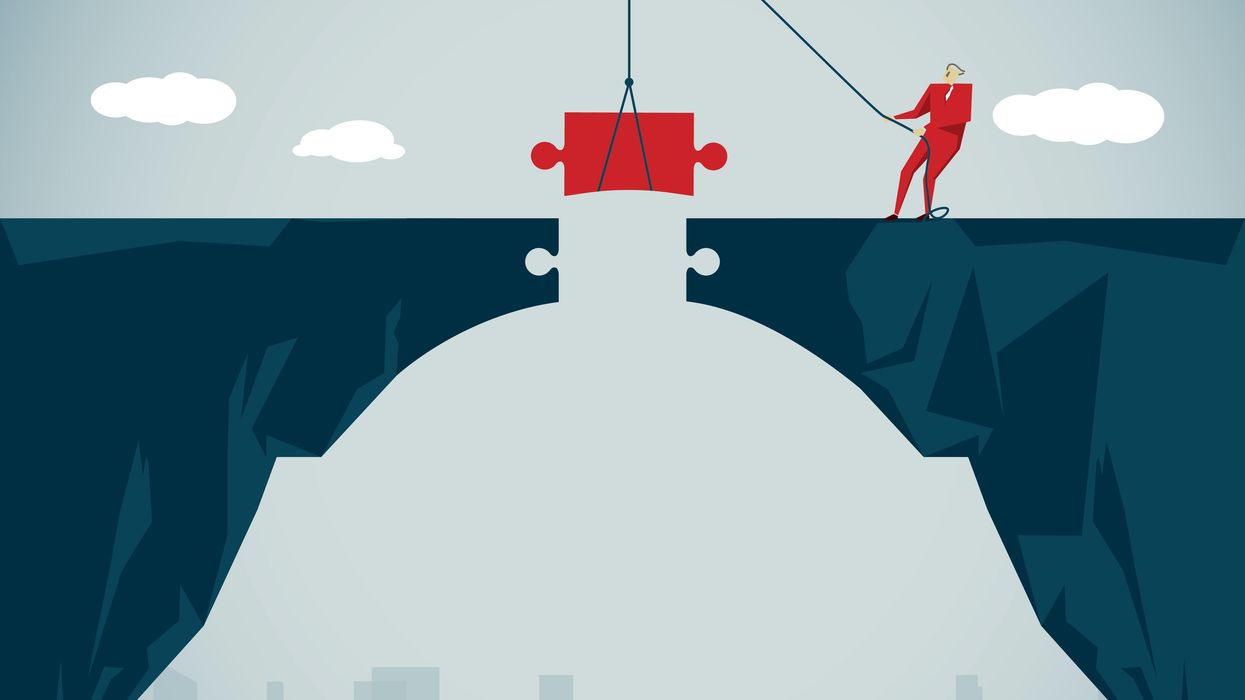Messafi is the founder of Teens Building Bridges, a nonprofit focused on promoting interfaith programming between teens. He interned at Civic Spirit over the summer and compiled information from leading nonprofits in the bridge-building space.
“There is a belief in ideological purity on the left and right, meaning that you have to have pure beliefs, and one large ideological difference destroys any effort of bipartisanship.” -Noah Silverman, Interfaith America
The 2020 presidential election and the controversies associated have caused divides and stereotypes that have still not been resolved to this day. As more people have been getting involved in politics because of these large divisions, the lack of civic education has proven to cause big problems in society. Constant misinformation on social media and a lack of knowledge of governmental institutions have led to many false and extreme opinions being spread, as well as more division.
At this moment, many organizations in the bridge-building space are scrambling for answers and looking for strategies to move forward. After interviewing members of Interfaith America, Combat Antisemitism Movement, Braver Angels and Bridge Alliance (which operates The Fulcrum), I have compiled a list of the strategies that will best help organizations trying to get through this period of tension in our history.
The biggest theme regarding political polarization solutions involves creating the conditions necessary for peaceful and productive debate:
- “When resolving political polarization, we need to ensure that people are knowledgeable about our governmental systems and how they work to have discussions.” (Alex Edwards Bourdrez, Braver Angels)
- “We both want what is best for this country, and we should have a conversation with each other about what we want best for this country. Find some similarities and make both of our ideas better by talking to each other.” (Noah Silverman, Interfaith America)
- “We are stubbornly neutral. How I think the country should run is irrelevant. What is relevant is making sure Americans understand all of their options, and how the system works to the best of its ability. We have member organizations whose solutions I disagree with. It doesn’t matter. Lots of organizations are trying to network like this, but Bridge Alliance represents all parts of the self-governance movement, as well as promotes all perspectives on equal footing. We do not endorse any solutions instead of trying to empower the American people, helping people vote, and having a healthy American system.” (Jeremy Garson, Bridge Alliance)
Bridge-building is about bringing the right people into the room and working together to focus on their most important issues. Divides can be avoided by discussing topics unrelated to these points of conflict, and by working together to benefit both communities. Outreach issues in the bridge-building space have been overcome by bringing in people who have connections to community leaders and organizations.
When the self-interests of both sides are satisfied, it leads to a successful, more personal bridge-building process. Bridge-building can be seen as a “fair trade,” where both sides would like to receive something to benefit their community in return for helping the other:
- “It’s much better to bring people in who are a part of these minority communities themselves. Bring in organizations that have certain political values instead of people who represent them. We bring in priests of congregations and others who understand the needs of communities and are a part of communities. Organizations need to understand the needs and problems of communities.” (Garson)
- “Rates of antisemitism go up with the rates of Islamophobia, anti-Christian, and anti-Mormon bias. If we fight religious bigotry in general, everyone wins. We can benefit both ourselves and the broader community by doing this.” (Silverman)
- “When interacting with those who differ from you, you mustn't allow one issue or one disagreement to ruin a conversation and relationship. Sometimes it’s hard for Catholic groups to talk about the Holocaust. We find a topic that is common and important to both and builds relationships from there.” (Arthur Maserjian, Combat Antisemitism Movement)
- “Operate like a two-way street by highlighting their work first, then ours. CAM always asks, “What can we do to support your work instead of what can you do for me? By doing this, CAM is more easily able to create connections with other groups.” (Maserjian)
- “The best way to make collaboration happen is to bring very smart, well-intentioned people into the room together, and let them do their thing. We do not force anyone to work together, but we appeal to self-interest by saying collaborating benefits them and the organization.” (Garson)
- “Finding common ground also means catering to both sides. When talking to members of the National Hellenic Society about the Holocaust, CAM caters to the Greek perspective, specifically discussing Greek individuals who saved Jews during the Holocaust. It is important to engage with positive elements of their history to have them advocate for issues important to us.” (Maserjian)
Organizations need to begin the bridge-building process on college campuses, where a smaller, more unified community can form future bonds as students move into the workforce.
- “If you build interfaith cooperation in colleges, you will build a generation with more cultural appreciation, and better leaders that focus on interfaith.” (Noah Silverman-Interfaith America)
While organizations recognize that bridge-building and resolving differences in every ideological conflict is an impossible task, meaningful steps in the right direction can connect communities that were previously on bad terms, or simply did not understand each other’s beliefs. With the help of new tactics for bridge-building and the presence of many great organizations that do this work constantly, we could work to stop division and make our communities more diverse to further end the vast divide in our country today. The emergence of new organizations that connect diverse groups through unique strategies and partnerships can involve more people in the movement, and gradually work to resolve our everlasting political tension.



















Trump & Hegseth gave Mark Kelly a huge 2028 gift